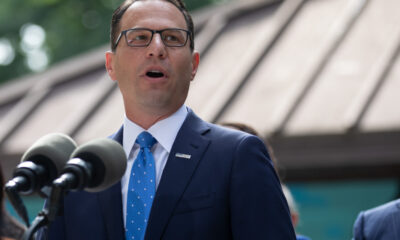Constitution
Legal Challenges to the SEC’s Climate-Related Disclosures Rule
The SEC violates its authorizing statute and all its earlier principles with its new climate disclosure rule, and invites challenge.

“And When Did You Last See Your Father?” William Frederick Yeames, 1878
The scene: Room 2128 Rayburn House Office Building at a hearing of the House Financial Services Committee on the SEC’s climate-related disclosures rule, April 10, 2024.
Representative Juan Vargas (D-CA): “How many of you believe in climate change?” Raises his right arm. “If you could please raise your hand.”
Chris Wright, founder, chairman and CEO of Liberty Energy, gesticulating: “It’s a bad question.”
The SEC climate disclosure rule
The Securities and Exchange Commission’s (SEC) 886-page climate disclosures document is its most controversial in its 90-year history. It has huge implications for every listed business, especially in the energy sector. The rule empowers climate activists by forcing companies to compile and disclose emissions data that their allies on Wall Street can then use to impose and monitor net zero targets on corporate America. Adopted on March 6, the rule was immediately challenged in the courts. Less than a month later, the SEC chose to stay the rule to pre-empt petitioners’ requests for an emergency stay pending judicial review.
When first proposed, the rule attracted an unprecedented volume of comments. It was adopted over the dissent of the SEC’s two Republican commissioners. In his withering dissent, Commissioner Mark Uyeda recalled the advice that he gives investors: “Do not rely on the marketing materials and read the prospectus instead.” The implication is devastating. In justifying the rule, the SEC falls beneath the standards of truthfulness it rightly expects of those whom it regulates.
Materiality in this rule is an illusion
In a speech shortly after adoption of the new rule, SEC chair Gary Gensler observed, “Materiality represents a fundamental building block of the disclosure requirements under the federal laws,” and went on to claim that the new role was “grounded in materiality.” This is bunk. As Commissioner Hester Peirce put it in her dissent, “While the Commission has decorated the final rule with materiality ribbons, the rule embraces materiality in name only.” In no context other than climate, writes Commissioner Uyeda, does the SEC require companies to provide an explanation for any expenses down to one percent of income before taxes, which it does for those incurred as a result of extreme weather.
Moreover, the SEC already requires disclosure of material climate information and had issued detailed guidance to that effect in 2010. As a brief on behalf of the U.S. Chambers of Commerce and the National Center for Public Policy Research (NCPPR) to the Eighth Circuit, which is hearing the case, points out, “the rule is necessarily duplicative and of no value.” The rule, the brief contends, contravenes the Administrative Procedure Act because “it purports to solve a ‘securities’ problem that the SEC failed to show exists.”
No cost-benefit analysis
In contravention of its own statutes, the SEC failed to conduct a rigorous cost-benefit analysis of its proposal, which, on its own massaged estimates, would cost more than double the compliance costs of all major existing SEC disclosures combined. The rule departs so far from what the SEC had initially proposed that the SEC erred in not re-proposing the rule and opening it up for comments, Commissioner Uyeda contends.
The standard of materiality adopted by the courts concerns whether there is a substantial likelihood that a reasonable investor would consider the information important in deciding how to vote or make an investment decision. What unites the universe of reasonable investors is the prospect of financial return. This means that there is an empirical test for materiality: Is the disclosure likely to move the price of the security? A statistical study submitted to the SEC by Professor Daniel Taylor at The Wharton School analyzed the market impact of corporate disclosures of greenhouse gas (GHG) emissions data. The study found “no evidence of a statistically significant change in stock price or trading volume in response to GHG disclosures” (emphasis in the original). But, as the U.S. Chambers/NCPPR brief notes, “the Commission inexplicably – and arbitrarily – failed even to consider Dr. Taylor’s findings” (emphasis in the original).
Fiduciary duty
A second class of disclosure relates to the integrity of the principal-agent relationship, that is, the reliance of dispersed stockholders on the good faith of corporate executives to act solely in the company’s interests. The purpose of such disclosures, for example on executive compensation, is to facilitate transparency and assure investors that executives aren’t engaged in corporate looting. The integrity of the shareholder-management relationship is factor which can have an outsize impact on corporate valuations and thus is of great interest to the reasonable investor. As David McLean notes in “The Case for Shareholders Capitalism,” the reason why a barrel of oil in 2000 was worth $12 of market capitalization at ExxonMobil and BP but only 20¢ for Russian oil companies is explained by radically differing standards of corporate governance. “U.S. stock exchange and U.S. laws and regulatory agencies make it difficult and costly to expropriate from shareholders,” McLean writes.
The SEC is catering to the demands of a small class of investors
In effect, the SEC subordinates materiality to investor demand. “Investors ranging from individual investors to large asset managers have indicated that they are making decisions in reliance on that information,” Chair Gensler says. But it is not the role of the SEC to mandate disclosure of corporate data in pursuance of every investment fad or fashion, however well grounded, thereby imposing costs on all investors. One of the SEC’s most cited “reasonable investors” in the rule’s text is As You Sow, a non-profit shareholder advocacy group. As You Sow’s mission is “to promote environmental and social corporate responsibility through shareholder advocacy, coalition building, and innovative legal strategies.” Its website has a prominent donate button, and two of its funders are the Soros-backed Foundation to Promote Open Society and the Open Society Foundations.
The SEC’s implicit categorization of climate-activist As You Sow as a “reasonable investor” demonstrates the truth of Commissioner Uyeda’s assertion that the SEC rule is “climate regulation promulgated under the Commission’s seal.” As the U.S. Chambers/NCPPR brief states, the SEC’s alleged justification for the rule is “pretextual,” that is, not the real reason, which, as I pointed out in my June 2022 comment letter, was the grounds on which the Supreme Court struck down the proposed citizenship question in the 2020 census.
Purpose of disclosure has changed
Until the climate-related disclosures rule was proposed, the SEC had viewed the purpose of disclosure as providing investors with information pertaining to a firm’s financial condition. The rule sees a vast, unilateral expansion of the SEC’s remit to information “necessary or appropriate in the public interest.” To Commissioner Uyeda, this raises the red flag of the major questions doctrine. “Extraordinary grants of regulatory authority are rarely accomplished through ‘modest words,’ ‘vague terms,’ or ‘subtle device[s],” the Supreme Court stated in West Virginia v. EPA. It is by conflating the purpose of disclosures to reveal a firm’s financial condition with disclosures deemed by the SEC as necessary in the public interest that the nonprofit activist As You Sow – “Our vision is a safe, just and sustainable world” – becomes, in the eyes of the SEC, a “reasonable investor.”
The SEC is engaging in slight of hand
The SEC performs a similar sleight of hand with the touchstone of materiality. When proposed, the rule would have required listed companies to nominate a director responsible for managing and reporting climate-related risk. That requirement was subsequently dropped. Instead, the SEC pressures boards to consider climate-related issues and then deems all such board-level discussion to be material and therefore disclosable. In effect, the SEC places a bug in the boardroom of every listed company that is activated whenever the words “climate” or “severe weather” are spoken. (Commissioner Uyeda notes that the SEC includes tornadoes as an example of a “severe weather event,” even though National Geographic says global warming could well suppress them – “the science just isn’t clear yet.”)
At the apex of the legal challenge to the rule is the First Amendment. The U.S. Chambers/NCPPR legal brief argues that the rule is contrary to the First Amendment prohibiting “the government from telling people what they must say,” as the Supreme Court had stated in 2006. “Yet that is exactly what the rule does, by design – forcing companies to engage in costly speech against their will on matters of contentious societal debate.” That freedom, the Supreme Court had previously ruled, “includes both the right to speak freely and the right to refrain from speaking at all.”
As the Eighth Circuit hears a challenge…
Few issues are as contentious as climate change and what, if anything, to do about it. Before Representative Vargas attempted to compel Chris Wright to indicate whether he believed in climate change, Wright testified about why Liberty Energy strenuously opposed the new rule, was challenging it in the courts, and had sought a stay. The SEC was venturing well outside its lane without any congressional mandate, Wright said.
Extrapolating the temperature trends derived from satellite measurement implies a two-degree Fahrenheit temperature rise by the end of the century. By contrast, Liberty Energy operates in minus 30°F in South Dakota and over 110°F in south Texas – a range of more than 140°F. There is no obvious growing threat to our business from extreme weather, Wright testified. The real climate risk to Liberty comes from climate regulations that are costly to comply with and invite litigation. With global demand for natural gas and oil at record highs and growing, the impact of the SEC rule will be to make it costlier and riskier to produce oil and gas in the United States. That cannot be in America’s economic or national security interests. Much is at stake as the Eighth Circuit hears the arguments against the SEC’s climate-related disclosure rule.
This article was originally published by RealClearEnergy and made available via RealClearWire.
Rupert Darwall is a senior fellow of the RealClear Foundation and author of The Folly of Climate Leadership: Net Zero and Britain’s Disastrous Energy Policies.
-

 Civilization4 days ago
Civilization4 days agoWhy Europe Shouldn’t Be Upset at Trump’s Venezuelan Actions
-

 Christianity Today4 days ago
Christianity Today4 days agoSurprising Revival: Gen Z Men & Highly Educated Lead Return to Religion
-

 Executive5 days ago
Executive5 days agoWaste of the Day: Can You Hear Me Now?
-

 Civilization2 days ago
Civilization2 days agoTariffs, the Supreme Court, and the Andrew Jackson Gambit
-

 Civilization2 days ago
Civilization2 days agoWhy Europe’s Institutional Status Quo is Now a Security Risk
-

 Civilization3 days ago
Civilization3 days agoDeporting Censorship: US Targets UK Government Ally Over Free Speech
-

 Executive3 days ago
Executive3 days agoWaste of the Day: Wire Fraud, Conflicts of Interest in Connecticut
-

 Education4 days ago
Education4 days agoWaste of the Day: Throwback Thursday – The Story of Robosquirrel












